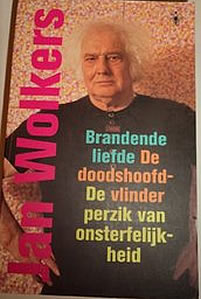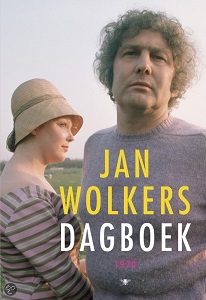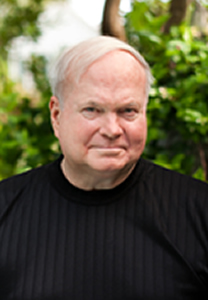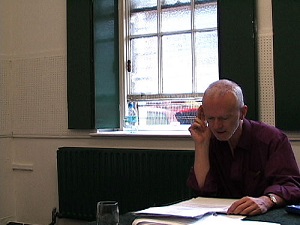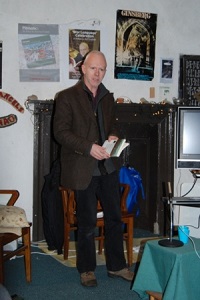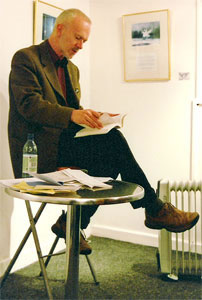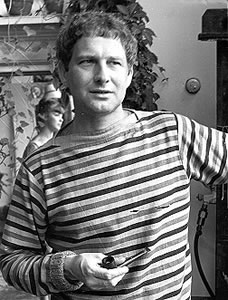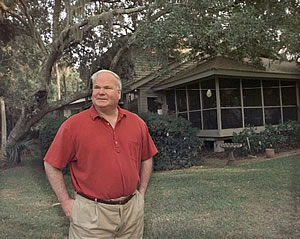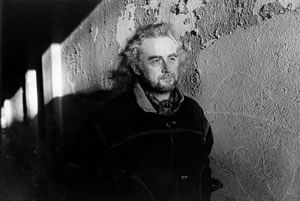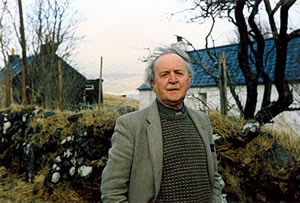De Nederlandse dichter, schrijver en beeldend kunstenaar Jan Wolkers werd geboren in Oegstgeest op 26 oktober 1925. Zie ook alle tags voor Jan Wolkers op dit blog.
Uit: Serpentina’s petticoat
“Het was zó’n natte novembermaand dat we dikke stukken hout op gelijke afstanden van elkaar in de tuin hadden gelegd, zodat we van blok tot blok springend tenminste met droge voeten in de schuur kwamen. De regen hield maar aan. Als lange draden grijze wol stroomden de stralen naar beneden, uit kluwens waar geen eind aan scheen te komen. De tuin kwam blank te staan. De stukken hout dreven weg en bleven tegen struiken en verdorde planten aan dobberen. Ze leken op een uit elkaar geslagen vloot en deden me denken aan een gravure in mijn geschiedenisboek, waaronder stond: Gods adem heeft ze verstrooid.
– We moeten toch in de schuur zien te komen, zei ik tegen Evert en Eddy.
Ik haalde de rubber jachtlaarzen van mijn vader te voorschijn, die al jaren niet meer gebruikt waren, zodat ik me afvroeg of ze nog wel waterdicht zouden zijn. Op het hoge stoepje voor de zijdeur van het huis trok ik ze aan. Ik liep er even aarzelend mee het water in, als iemand die in april de zee probeert. Mijn voeten bleven droog. Daarna draaide ik me met de rug naar Eddy toe en spreidde mijn armen uit. Hij sprong zo wild, dat ik bijna mijn evenwicht verloor. Ik sloeg mijn armen rond zijn harde lange dijen en ging in de richting van de schuur lopen. Als ik een voet verplaatste bleef er een klein bruin wolkje in het water achter. Ik voelde me een vliegtuig dat door ontploffende granaten achtervolgd wordt. Mijn tenen moest ik omhoogsteken om niet uit de laarzen te schieten die in de modder vastzogen.
Toen ik terugging om Evert te halen liep ik over het gazon. Als geheime donkere kreeften lagen grote dahliaknollen onder water, die op het gras te drogen waren gelegd voor de regen kwam. Mijn vader had ze maar laten liggen. Je kunt ze toch niet eten en wie denkt er aan bloemen voor volgend jaar in zo’n verschrikkelijke tijd, had hij gezegd. Ik trapte tegen de knollen. Ze vielen uit elkaar, terwijl er een lichtgele brij langzaam in het water opwolkte.
We lagen op een harde matras gevuld met zeegras. De schuurdeur hadden we open laten staan en we keken, zonder te spreken, naar de luchtbellen die de regen in het water sloeg. Soms stond een van ons op en pakte een paar tabaksbladeren, die in een lange rij aan een touw langs de zoldering hingen. Ze hadden goudgeel moeten worden, maar als onwillige kameleons waren ze in een vuile bruingroene kleur blijven steken. We knipten ze zorgvuldig fijn en rolden er sigaretten van in papier dat we uit een oud kerkboek scheurden. Ik had het boek uit de bibliotheek van mijn vader gehaald en er het binnenwerk uit getrokken”.
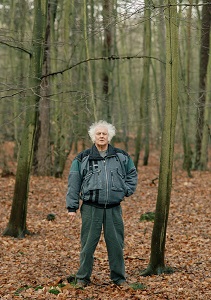
Jan Wolkers (26 oktober 1925 – 19 oktober 2007)
De Nederlandse schrijfster en journaliste Marja Pruis werd geboren in Amsterdam op 26 oktober 1959. Zie ook alle tags voor Marja Pruis op dit blog.
Uit: Omdat je het Waard Bent
“Soms heb ik het idee dat ik van ver kom. Alsof nu een ander soort mores heerst dan waarmee ik ben opgegroeid, en ik me iedere keer over weerzin, schrik of angst moet heen zetten om me in de wereld van nu te begeven. Inmiddels ben ik oud genoeg om te weten dat als ik dit idee heb, ik hier niet alleen in sta. In die zin zou iedereen het gevoel kunnen hebben van ver te komen en wordt deze planeet bewoond door aliens.
Misschien is het idee dat er een tijd bestaat waarin je zou kunnen samenvallen met jezelf, een tijd waarin je je thuis voelt, een illusie. Per definitie onmogelijk, omdat de definitie van leven veranderlijkheid is. Het is denk ik niet dat ik terugverlang naar vroeger. Ik wil niet achteruit – maar vooruit is ook weer zoiets. Het is het splijtende gevoel dat zich achter me een zwart-witfilm ontrolt, zonder geluid – het enige geluid dat je hoort is het geratel van een amechtige projector – terwijl vóór me een bonte kermis gaande is waarop het verplicht is een 3D-bril op te zetten. Het geluid staat te hard, de gezichten komen te dichtbij. Een polonaise waarbij je moet inhaken op straffe van onzichtbaarheid.
Het heeft te maken met dat iedereen een vertegenwoordiger van zichzelf lijkt te zijn geworden, iedereen moet zich laten zien, en wat iedereen laat zien, moet dan weer het beste zijn dat hij of zij mogelijkerwijs kan laten zien. En dat is, ben ik bang, weer terug te voeren op het grote wereldwijde web waarop de mensheid sinds enige decennia is aangesloten en waarvan we waarschijnlijk nooit meer losgekoppeld raken.
De druk om constant bereikbaar te zijn, jezelf in heel je glorie te openbaren, je kunsten en goede daden op eigen houtje te etaleren… Ik weet dat de sociale media ook zegenrijk effect sorteren – Revolutie!”
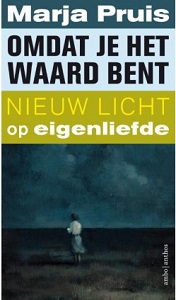
Marja Pruis (Amsterdam, 26 oktober 1959)
Cover
De Nederlandse schrijfster Maartje Wortel werd geboren in Eemnes op 26 oktober 1982. Zie ook alle tags voor Maartje Wortel op dit blog.
Uit: Half mens
“Ik heb laatst gelezen dat je ’s ochtends bij het wakker worden al beslist of je diezelfde dag bijvoorbeeld een ijsje gaat eten. Niet bewust, maar iets in je heeft al gekozen. Vandaag mag je ijs.
Je moet niet alles geloven wat ze in de krant zetten, maar nu ik er met terugwerkende kracht over nadenk, weet ik dat het waar is.
Iets in je heeft al gekozen. Zo was het ook bij Michael Poloni. Hij heeft lang moeten wachten. Toch heeft hij uiteindelijk gekregen waar hij naar verlangde, als ik het goed begrepen heb. Hij zag er in ieder geval gelukkig uit, dat kunnen niet alle mensen zeggen. Als ikzelf eens aan iemand vraag: ‘Hoe zie ik eruit vandaag?’ dan zeggen de mensen negen van de tien keer: ‘Weet je zeker dat je het horen wil?’ De tiende is mijn moeder. Zij zegt: ‘Jongen, jij bent een beauty en dat weet je best.’ Dat zijn de dagen waarop ik mijn hoed opzet.
Maar goed, het gaat nu niet om mij. Het gaat om Michael Poloni. Voor hem begon het ongeveer een half jaar geleden met een ongeluk. Het was allemaal al veel eerder begonnen natuurlijk, maar vanaf de zaterdag waarop het ongeluk plaatsvond begon het voor hem pas echt. Iets in hem had al lang daarvoor gekozen. Vandaag mag je ijs. En het besef wat dat te betekenen heeft komt altijd later, als je je ijsje al ophebt, begrijp je?
Laat ik dit vooropstellen: met mij heeft dit hele verhaal uiteindelijk niets te maken. Per toeval werd ik, James Dillard, drieënveertig jaar oud, geboren en getogen in Los Angeles, deelgenoot van dit verhaal, maar langs de zijlijn, en voor een paar maanden maar.
Het was op een dinsdagmorgen, ik had een bagel gegeten, daarna had ik gekakt terwijl ik ondertussen een hoofdstuk las uit The Road to Los Angeles. Ik had mijn tanden gepoetst en overwogen of ik me zou scheren.Ik had koffiegedronken met mijn huisgenote Allijah, een bloedmooi meisje. We zaten aan de straatkant, met de loodsdeur open. Ik keek naar het verkeer en zij vertelde over haar examens, wat me vrij weinig interesseerde, ze had al een vriend. De buurvrouw zei gedag, ze loopt kreupel. Ik vroeg me af of het niet link was dat ze zelf nog in haar auto reed. Ook dacht ik aan wat ik die middag zou gaan doen, en dat alles hetzelfde zou zijn als wat ik gisteren had gedaan en de dag daarvoor en ook de dag daarvoor. Ik deed niets, al mijn hele leven niet. Ik leefde van anticlimax naar anticlimax. Dan kan je in z’n grote stad als Los Angeles wonen maar dat lost niets op.”
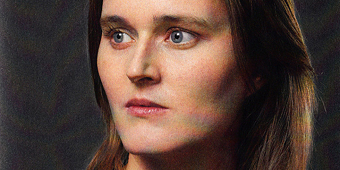
Maartje Wortel (Eemnes, 26 oktober 1982)
De Engelse dichter, schrijver en biograaf Andrew Motion werd geboren op 26 oktober 1952 in Braintree in Essex. Zie ook alle tags voor Andrew Motion op dit blog.
Laying the Fire
I am downstairs early
looking for something to do
when I find my father on his knees
at the fireplace in the sitting-room
sweeping ash
from around and beneath the grate
with the soft brown hand-brush
he keeps especially for this.
Has he been here all night
waiting to catch me out?
So far as I can tell
I have done nothing wrong.
I think so again
when he calls my name
without turning round;
he must have seen me
with the eyes in the back of his head.
‘What’s the matter old boy?
Couldn’t sleep?’
His voice is kinder than I expect,
as though he knows
we have in common a sadness
I do not feel yet.
I skate towards him in my grey socks
over the polished boards of the sitting-room,
negotiating the rugs
with their patterns of almost-dragons.
He still does not turn round.
He is concentrating now
on arranging a stack of kindling
on crumpled newspaper in the fire basket,
pressing small lumps of coal
carefully between the sticks
as though he is decorating a cake.
Then he spurts a match,
and chucks it on any old how,
before spreading a fresh sheet of newspaper
over the whole mouth of the fireplace
to make the flames take hold.
Why this fresh sheet
does not also catch alight
I cannot think.
The flames are very close.
I can see them
and hear them raging
through yesterday’s cartoon of President Kennedy
and President Khrushchev
racing towards each other in their motorcars
both shouting
I’m sure he’s going to stop first!
But there’s no need to worry.
Everything
is just as my father wants it to be,
and in due time,
when the fire is burning nicely,
he whisks the newspaper clear,
folds it under his arm,
and picks up the dustpan
with the debris of the night before.
Has he just spoken to me again?
I do not think so. I
do not know.
I was thinking how neat he is.
I was asking myself:
will I be like this? How will I manage?
After that he chooses a log
from the wicker wood-basket
to balance on the coals,
and admires his handiwork.
When the time comes to follow him,
glide, glide over the polished floor,
he leads the way to the dustbins.
A breath of ash
pours continuously over his shoulder
from the pan he carries before him
like a man bearing a gift
in a picture of a man bearing a gift.
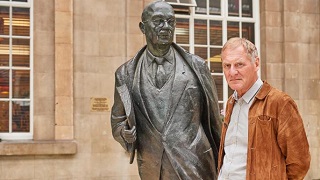
Andrew Motion (Braintree, 26 oktober 1952)
Hier bij een standbeeld van Philip Larkin in Hull
De Nederlandse dichter Harry M.P. van de Vijfeijke werd geboren op 26 oktober 1946 in Waalre. Zie ook alle tags voor Harry M.P. van de Vijfeijke op dit blog.
Waar de witgeschilde berken
Waar de witgeschilde berken het uitgillen
in hun bladerwolken, geel, een plas,
waarop ik voor het eerst mijn smalte
overwon en op ijzers uithuizig
comfortabel was.
De zwarte vloer, vijver van verre dagen.
Nu mijn vader sterft en ik nog
wat blijf, ga ik mij vast terug
op de vroege vlakten wagen.
De stad. We bleven
De stad. We bleven.
Ooit was er een reden.
Zij had het ongemakkelijk die tijd, de stad.
Er werden ingewanden weggehaald,
geschiedenis bracht ongerief, gewoeker.
Ik werd verwacht te bloeien. Klaproos
op kaalslag. Ik viel niet mee.
We raakten in de pas, het tumult
waarmee ik je bezocht werd milder.
De trouw die ik belijd is er niet een
van het zweren.
Het is liefde, een van goed vaarwater,
rustig en welwillend als een schil.
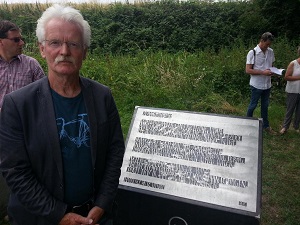
Harry M.P. van de Vijfeijke (Waalre, 26 oktober 1946)
De Amerikaanse schrijver Stephen L. Carter werd geboren op 26 oktober 1954 in Washington, D.C. Zie ook alle tags voor Stephen L. Carter op dit blog.
Uit: The Impeachment of Abraham Lincoln
“The President was dying.
As the grim news spread through Washington City, angry crowds spilled into the cold, muddy night. Abraham Lincoln had been shot at Ford’s Theatre, on Tenth Street. The wounds were mortal, people were saying. There was no way he could survive. The war was over, the South utterly vanquished, yet somehow its withered hand had reached up into the nation’s capital and extracted this bitter revenge. The crowds became mobs, looking for somebody to hang. Some wanted to burn Ford’s to the ground. Others marched toward Old Capitol Prison, where many leaders of the late rebellion were still being held. Rumors passed from mouth to mouth: The Vice- President had been murdered in his rooms at Kirkwood House. The Secretary of State had been stabbed to death in his mansion on Lafayette Square. Confederate troops were advancing on the city. Or Union troops: nobody seemed to know for sure, and a coup d’état had been rumored for years. Outside Ford’s Theatre, a man in the blood-spattered uniform of an army major and a doctor carrying a candle fought their way into the street. A group bearing Lincoln’s unmoving body followed behind. Mrs. Lincoln, face like chalk, clutched her husband’s stiff hand. People leaned in, trying to see or touch. Men groaned. Women wept. A soldier banged on the door of a row house across the way. They carried the President inside and shut the door. People craned to peer in the windows. Minutes later, Secretary of War Stanton, the most feared man in Washington, arrived in an unguarded carriage and raced inside. Other officials followed. Furious soldiers took up positions on the sidewalk but seemed to have no clear orders. They battered members of the crowd for practice. Other men went in. The people who had been closest to the body passed on the story: the President’s head was a mass of blood.
Meanwhile, the hue and cry had been raised. That actor fellow. Wilkes Booth. He had shot the President and leaped to the stage, then escaped on horseback. Somehow the mob was armed now, looking for someone to whom they might do mayhem.”
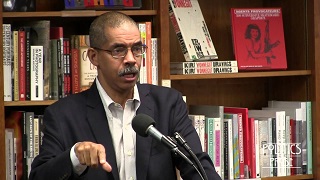
Stephen L. Carter (Washington, 26 oktober 1954)
De Zweedse dichteres en schrijfster Karin Maria Boye werd geboren op 26 oktober 1900 in Göteborg. Zie ook alle tags voor Karin Boye op dit blog.
Evening Stillness
Feel how near Reality dwells.
She breathes near here
on evenings with no wind.
Perhaps when no one looks, she shows herself,
The sun glides over rock and grass.
In her silent play
life’s spirit is concealed.
Never as this evening was he so close.
I have met a stranger with silent lips.
If I had reached out my hand
I would have brushed his soul,
as we passed each other with timid steps.
Burning Candles
Now cries the night aloud in need,
with unknown dread a-quake.
Now light I here two candles straight
for eternal darkness’ sake.
If the Lord’s angels pass by here,
the light will call to them,
then they will hear the flames sing my prayer,
and bear it with them home.
They are warriors who go in armour of fire
with word from the Almighty’s house.
Their speech has no words for harsh and sweet.
but for burning candles it has.
That is why they stand on the storm’s back
between the whipping wings’ din,
that is why they smile at the darkness’s power
and meet the cold with disdain.
O Lord my God, O terrible God,
Your mantle’s roar booms free.
I pray for flowers and pray for peace –
but give burning candles to me!
Vertaald door David McDuff
Karin Boye (26 oktober 1900 – 24 april 1941)
Standbeeld in Göteborg (detail)
De Ierse dichter Trevor Joyce werd geboren op 26 oktober 1947 in Dublin. Zie ook alle tags voor Trevor Joyce op dit blog.
FROM A PHANTOM HYPERSESTINA (Fragment)
peacocks
seem out
of place
and uneasy
here
large
rattling
tails
folded
eyes
all
neatly
stacked
like tenses
of some
complex
and irregular
verb tabled
in a grammar
could
should
would
or a hand
of cards
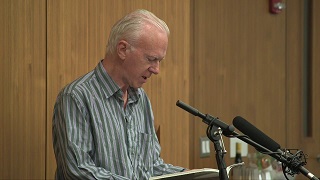
Trevor Joyce (Dublin, 26 oktober 1947)
De Amerikaanse schrijver Pat Conroy werd geboren op 26 oktober 1945 in Atlanta, Georgia. Zie ook alle tags voor Pat Conroy op dit blog.
Uit Beach Music
“I am usually up when the Piazza Farnese awakens. In darkness I brew my coffee and take a cup up to the terrace where I watch first light come over the deer-colored city.
At six in the morning, the man at the newspaper stand arrives and begins arranging magazines beneath his canopy. Then a truck enters the piazza from the west carrying bales of Il Messaggero and other morning papers. The two carabinieri who guard the entrance to the French Embassy switch on the lights of their jeep to begin their slow perfunctory circling of the Palazzo Farnese. Wearing the same expressions, like face cards in a disfigured deck, the carabinieri seem bored and usually you can see the pale glow of their cigarettes against the dashboards as they sit in their cars during the long Roman night. A van carrying fragrant bags of coffee then arrives in front of the Bon Caffe at the same time the owner of the cafe rolls up the steel shutters. His first cup of coffee always goes to the driver of the truck, the second to the owner of the newspaper stand. A small boy, the son of the owner, then takes two cups of black coffee to the carabinieri across the piazza just as the nuns in Santa Brigida begin to stir in the convent across from my building.
While it is still dark beneath the annealed stars and low-seated moon a nun opens the small steel gate in front of the Church of Santa Brigida, an act signifying that Mass is about to start. There is solitude in the fatigue of watching such beginnings and I then ritually count the thirteen churches I can see from my terrace. I was still counting them when I spotted a man who had been following us for the last few days enter the piazza from the Campo dei Fiori.
I slipped behind an oleander bush as the man looked up toward my terrace, then entered the Bon Caffe. I continued to count the bell towers and the four great moony clocks whose hands commemorated the exact moment of their death for Rome to see. I listened with pleasure to the music of the fountains in the piazza.
Across the piazza, a nun moved on the church’s terrace this Monday morning, heedless as a moth in her mothering of roses. A brindled cat stalked a pigeon into the first slice of sunlight in the piazza, but a bum clapped his hands and shooed them both away. The man who’d been following me came out of the Bon Caffe and looked my way again. He lit a cigarette, then walked to the newspaper stand and bought a copy of Il Messaggero.
Below me the piazza began to bloom with life as carts rolled into it and pedestrians entered from the side streets. Pigeons called to each other from the stately rows of fleurs-de-lys that stretched along the entablature of the French Embassy. I love both the regularity and austereness of my piazza.”

Pat Conroy (26 oktober 1945 – 4 maart 2016)
Cover
Zie voor nog meer schrijvers van de 26e oktober ook mijn blog van 26 oktober 2014 deel 2.

